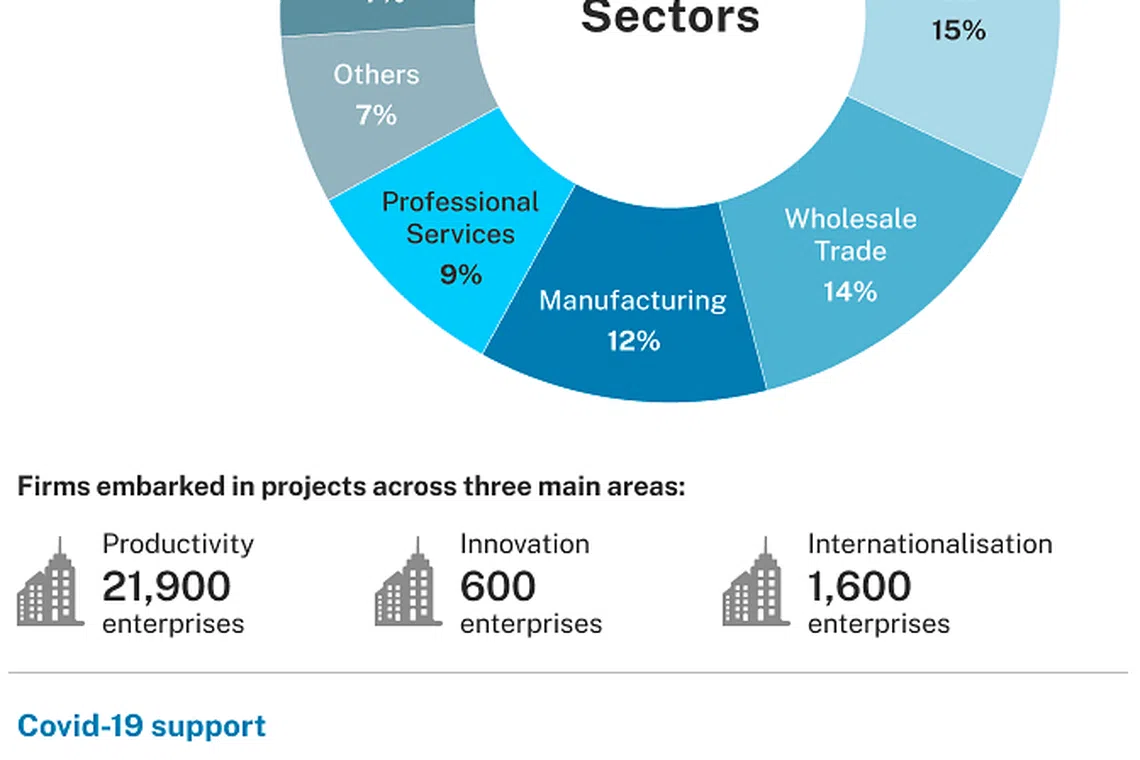More productivity support but fewer Covid-related loans in 2021: ESG

MORE companies tapped Enterprise Singapore (ESG) support for productivity and capability upgrading in 2021, even as fewer received pandemic-related loans, according to the statutory board's year-in-review on Friday (Feb 11).
While the government will continue to help businesses adjust to Covid-19, it is "timely to also help them go on the offensive and seize opportunities locally and abroad", said Minister for Trade and Industry Gan Kim Yong, adding that ESG's internationalisation drive will intensify to make up for the last 2 years.
ESG facilitated S$8.6 billion in loans to 12,600 companies in 2021, largely under Covid-related loan programmes, compared to S$18 billion to 21,000 companies the year before.
The top sectors which received support were wholesale trade, construction, manufacturing, professional services and retail.
Small and micro businesses received the most help, with 50 and 41 per cent of loans being disbursed to these enterprises respectively.
With more sectors recovering in 2021, ESG chief executive Png Cheong Boon said fewer companies needed to tap the statutory board for financial support compared to 2020 when Covid-19 first hit Singapore.
And since some loans have multi-year tenures, some companies which received financial aid in 2020 did not need to apply again this year, he added.
"That said, we shouldn't look at (the numbers) in isolation... If you look at 2021 numbers, they are still 4 times as high as 2019 and 2018, so it's still a significant increase in the loans that are given out compared to pre-Covid times," said Png.
On the whole for 2021, ESG supported 22,100 companies to transform and grow their businesses, up 44 per cent from the year before.
The projects embarked upon are expected to bring in S$17.9 billion in value-add and 23,300 skilled jobs.
The top sectors involved in these projects include food services, retail, wholesale trade and manufacturing.
More companies undertook projects in productivity and capability upgrading: 21,900 in 2021, up from 14,800 in 2020 and 8,300 in 2019.
In innovation, 600 companies embarked on projects in 2021 - the same as the year before, and up from the 550 companies that took up such projects before the pandemic in 2019.
The number of companies that embarked on internationalisation projects in 2021 continued to lag behind pre-Covid numbers, though it remained the same from a year ago.
A total of 1,600 companies pursued internationalisation in 2021, down from 2,600 in 2019, with top markets including China, the United States and South-east Asia.

Singapore businesses need to "urgently recover the lost ground" after internationalisation efforts were constrained by travel restrictions during the last 2 years of the pandemic, said Gan.
"We now have to prepare ourselves so that when the world economy reopens fully and recovers quickly, we are the first out of the gate to seize these opportunities," said Gan.
On that note, ESG chairman Peter Ong said the statutory board plans to step up its internationalisation drive in 2022, as it remains key for Singapore's growth.
"The return of global growth to pre-pandemic levels presents good opportunities for companies... We must step up our engagement in tandem to match the offerings of our companies," he said.
For instance, ESG will help companies with businesses overseas to deepen their market presence, encouraging them to look beyond major cities.
It will also help companies enter new markets depending on the opportunities available in each specific market, such as in Latin America and Africa for consumer-related, trade and digital and infrastructure solutions, and in the US and Europe in the green economy, logistics and supply chain resilience.
A second priority is innovation and startup growth, said Ong. In the startup scene, ESG supported about 2,300 tech startups to access funding, incubation and mentorship through Startup SG programmes and assistance from partners in 2021, a 10 per cent increase from the year before.
Its investment arm, Seeds Capital, invested S$48.6 million into 46 early-stage tech startups, catalysing close to S$334 million of private sector investments.
In 2021, ESG also worked with more than 60 organisations from 11 countries for Open Innovation Challenges. "To take it one step further, ESG will step up our focus on driving cross border innovation," said Ong.
"For 2022, we have already identified more than 10 innovation calls with countries across Europe and Asia and we will be announcing them in due course."
A third priority is seizing new opportunities in emerging fields such as sustainability and emerging tech.
For instance, ESG launched its Enterprise Sustainability Programme in October last year, partnering industry stakeholders to roll out courses for companies that are new to sustainability, with the first run to begin this March.
Having already supported some trade associations and chambers (TACs) with sustainability road maps to encourage sustainable supply chains, ESG will expand this to TACs in more sectors in 2022.
As for emerging tech, Ong said the plan is to build on existing plans to groom companies in niche areas such as blockchain and immersive tech.
Finally, while foreign direct investment continues to be an important part of Singapore's economic strategy, there is room to invest more resources into "locally grown and globally competitive enterprises", said Gan.
This is not a new strategy, but ESG will "provide even stronger support" for local entrepreneurs, he added.
Ong said that ESG will ramp up its efforts to groom more home-grown companies by identifying and partnering with more aspiring local companies and supporting them in areas such as internationalisation, financing and talent development, among others.
Said Ong: "The last 2 years have presented many challenges for our businesses... Now, we need to shift gears, prepare for a shift in the environment, recover lost ground and focus on capturing growth."
Decoding Asia newsletter: your guide to navigating Asia in a new global order. Sign up here to get Decoding Asia newsletter. Delivered to your inbox. Free.
Copyright SPH Media. All rights reserved.
